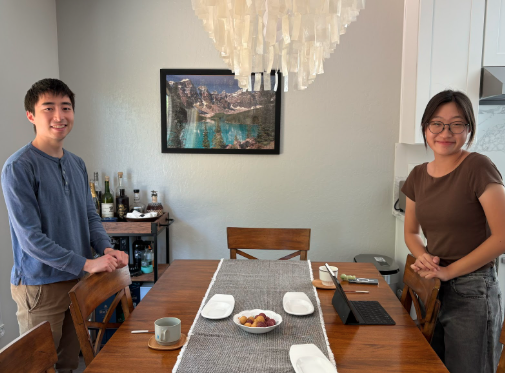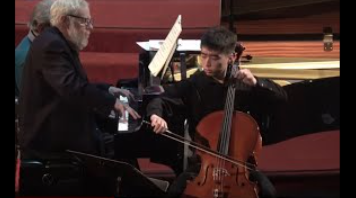What’s It Like to Be a Professional Musician in the SF Symphony?
A revealing Q/A with cellist Davis You.
I thought to myself, “what is your role in society? What good are you actually doing for people?”
I actually thought that was really interesting. So, I wanted to kind of keep exploring that and it led me to music.
Rejection, failure, dismissal. These are words that many musicians often have to hear. So then, what does it take to become successful?
Davis You is one of the eight total cellists playing at the San Francisco Symphony. He joined the SFS during the 2024-25 season after auditioning with hundreds of other musicians. Davis is an extraordinary instrumentalist, being the youngest player in his cello section and winning several competitions, such as the Hudson Valley Philharmonic String Competition, National YoungArts Foundation Competition, and the NEC Honors Ensemble Competition.
Besides playing in the San Francisco Symphony, Davis You also tutors cello to students. Lucky for my younger sister, Gia, my mom had connections with Davis. Gia wanted to learn an instrument, so my mom considered the cello because she loved the beautiful sound that it makes. So, my mum asked Davis for lessons for Gia and she started learning the cello with him! It’s been a whole year since Gia has been practicing the cello and is hoping to join the orchestra in middle school. She has been working really hard and has had lots of fun on her music journey so far. I was really curious about what life is like as a professional musician and I wanted to learn about Davis’ music journey to success. So, I asked Davis if I could interview him for my blog and he said yes!
As a musician myself, I wanted to learn about what it really takes to become a professional. It was an absolute honor to get to talk to and learn from a successful musician like him and there was so much I took away from this special interview. In summary, I learned that it takes lots of hard work, passion, and curiosity to reach a high level of music.
When did you start playing the cello and why?
When I was two, I really wanted to play the oboe. But they didn’t make oboes that were small enough for little lungs. And then I was four and I asked again, can I play the oboe? Again, I wasn’t there yet. So then my mom, who used to play the cello in high school suggested, “Why don’t you play the cello? I can help you.” And that’s kind of how I got started.
What do you like about the cello?
One thing is, I think this is true with any instrument, there's always more progress that you can make. There’s always a goal that you can work towards and learn something new. I think that is actually a really nice feeling. Also, for the cello specifically, it is a low bass instrument, which is the support for everyone else in the orchestra. Cellos aren’t the most flashy or have the melody all the time, but you have a lot of influence over the group and how they sound.
Who were your biggest influences growing up?
Definitely my teachers. Maybe that’s obvious, but I had this one teacher who I worked with for like eight years, and she really showed me a lot of different types of music. So, I was inspired musically in that way. Then in high school, I had a different cello teacher and he was a lot more analytical and detail oriented. I felt that, in a sense, I could focus more on the learning aspect—the technique and stuff. There was so much more than I originally thought. The attitude of always going super in depth and questioning things was really impactful for me.
And of course, there are cello players that I looked up to, like Yo-Yo Ma. It’s such an overused example but he’s very inspiring—not just because he’s a great cello player, but because he’s genuinely a good person. He likes to volunteer a lot and tries to really use his music and his platform to bring about good things.
When did you know you wanted to become a professional musician?
I think for some people, there is that specific moment. For me, not really. It was kind of a gradual realization. Once you get to high school, you have to start thinking about college and what you want to major in because that determines what school you want to go to. The cello has always been really interesting to me. At the time I was kind of doing some programming and computer science on the side, but the only thing I really cared about was cello and music in general.
In high school I started to question more, “What does it mean to be a musician?” And it’s, I think, a really hard question to answer. And that’s why it was also interesting to answer. Like what is “your role in society? What good are you actually doing for people?” I actually thought that was really interesting. So, I wanted to kind of keep exploring that and it led me to music.
What was the audition process like for the San Francisco Symphony?
For professional orchestra auditions, typically, there's four or five rounds. First round, you send in a résumé. Second round, if you pass that, and your resume's good enough, then you send in an audio recording of yourself playing. If they think that's good enough, then you get invited to a live round of playing. And the live round could be really intense, because they have a lot of people to get through. So each person gets maybe like five minutes on stage, and you have to use those five minutes to convince them that you're the best person. And then if you've passed that round, then there's like two or three more live auditions. And each time there's fewer and fewer people, and after you play, you go on, you go into a different room and you're just kind of like waiting there for a call. It's just, it's very stressful.
What really helped me with the San Francisco audition was that it wasn't my first professional try.
I'd taken other auditions I didn't win, but those experiences prepared me. I learned how to manage my nerves on stage, what kinds of music they were likely to ask for, and what the process felt like. So, by the time San Francisco came around, it felt more manageable. I also had a lot of friends supporting me.
There were probably a couple hundred people auditioning for SFS. And then there were 45 people in the live auditions, and from those, there were two winners chosen—me and another player. We filled in the two open spots because two cellists had retired earlier and we both got to join the symphony as a result of that.
How many hours do you practice a day?
Individually, it definitely varies. Probably on average, around two hours a day. Which is a lot, but not as much as some really intense people, especially pianists who might practice six to eight hours a day if they're at a professional level or trying to be professional level. But, if you include rehearsal time, which is in a way, kind of like practicing, we could have between two and five hours of rehearsal per day plus concerts and all that. It could definitely add up.
What’s a day like on a performance day?
I guess it depends. Usually, we have three concerts every week. And so on Friday, usually we have a dress rehearsal in the morning. It's like two and a half hours and then a concert at night. It usually starts at 7:30. So the dress rehearsal is when the whole orchestra runs through the entire program for the night, just to make sure that we got all the transitions figured out and there's no surprises. Then do whatever else you want to do on the day. Usually, I'll practice a little bit, make sure I touch up any rough spots, relax and have dinner. Concerts end pretty late, but after that I go home and rest. Saturday and Sunday, we don't have a dress rehearsal in the morning. So, I just have a normal weekend, plus a concert in the evening.
What tips do you have to give to people with performance anxiety?
There's a lot of different ways people struggle with performance anxiety. I can only share my personal experiences. I feel like the most important thing is to be prepared. If you feel like you're prepared, then you are going to be confident in what you are doing. I want to consistently make progress before the actual performance.
During an actual audition, there are many strategies you can use. One is really focusing on your breathing and the way your body is reacting. Make sure that you're not tensing up or holding your breath more than you have to. Because the cello doesn't require any air to play, really try to calm down your breathing. And just even by focusing on that, takes your mind off of some of the performance anxiety.
The other huge thing would be to do practice auditions beforehand, so that by the time it happens, you are already prepared. This goes back to my audition experience. I auditioned in, I think, four other places before SFS. So by the time I auditioned for the San Francisco committee, I had plenty of auditioning experience. So, for people who have performance anxiety, even if it's not music, but public speaking, if you do it a lot in front of other people and are prepared, then when it's time to perform, it won't be such a good deal.
What advice would you give young musicians who are hoping to grow up to pursue music?
You have to be really curious to become a professional musician, in a broad sense, because the musician's life is so kind of unpredictable. However you grow the most when you are exploring a lot. and remaining open minded, because you never know what opportunity will lead to what. Playing in the San Francisco Symphony is now my job. But if I wasn't open-minded to playing other types of music, like chamber music, solo, orchestral stuff before— I wouldn't have the same experience that I needed to win the audition. For other people, let's say you're not in a full-time position and you're a freelancer. You have to be open and curious because you never know who might be listening to you and if they will offer you a performance later. You have to work hard, but you also have to work hard at being curious, exploring, and being open to a lot of different things.
Links
“Davis You.” SFSymphony, https://www.sfsymphony.org/Data/Event-Data/Artists/Y/Davis-You





